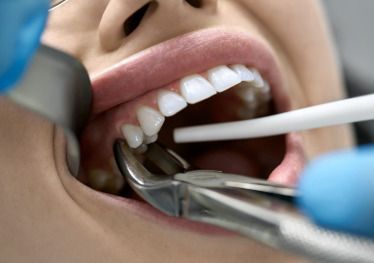
Tooth Extractions – Garland, TX
Gentle Extractions for Problem Teeth

Tooth extractions are the last line of defense against severe dental issues. Though it can be stressful and even saddening to lose a tooth, it’s important to remember that the benefits will far outweigh the negatives. At Dentistry by Brand, our team uses gentle techniques to remove problem teeth for many reasons. If you’re curious about tooth extractions, read more below. You’ll find everything you need to know from the process itself to aftercare and beyond.
Why Choose Dentistry by Brand For Tooth Extractions?
- Dental Practice Family-Owned & Operated For 30+ Years
- Experienced Dentist With Same-Day Appointments Available
- New Facility With State-of-the-Art Dental Technology
Reasons Why Tooth Extractions Are Necessary

Tooth extractions are sometimes necessary to maintain or improve your oral health. Common reasons include:
- Severe tooth decay that can't be treated with a filling or crown
- Advanced gum disease that has damaged the surrounding bone
- Impacted teeth (like wisdom teeth) that cause pain or misalignment
- Remove a stubborn baby tooth that’s stunting development
- Preparation for orthodontic treatment
- Remove broken teeth that cannot be repaired
By addressing these issues, extractions help prevent complications for your oral health due to decay, disease, or infection. This helps clear the way for a healthier, more comfortable smile.
The Process of Removing a Tooth

Sometimes knowing a process can help you be less nervous about it. Extractions begin with a thorough examination and X-rays to assess the condition of your tooth and surrounding bone structure. Next, Local anesthesia is administered to numb the area, ensuring a more comfortable experience.
For a simple extraction, your dentist will then loosen the tooth with an elevator tool and remove it using forceps. For more complex cases, like impacted teeth, surgical extraction may be necessary. This involves making an incision in the gum to access the tooth, which may be broken into smaller pieces for easier removal.
After the tooth is extracted, the site is cleaned, and stitches may be placed to promote healing. The entire procedure is designed to be as quick and comfortable as possible. Lastly, your dentist will discuss tooth replacement options that fit your needs and budget. It’s important to begin this planning as soon as possible to prevent complications.
Tooth Extraction Aftercare

Proper aftercare is very important for a smooth recovery after tooth extraction. Here are some general tips to make your experience as smooth as possible:
- For the first 30 minutes after your procedure, try to bite down on the gauze pad we provide to help control the bleeding.
- Avoid rinsing vigorously, using straws, or spitting for the first 24 hours, including during oral hygiene. This will help protect the blood clot that forms in the socket.
- Apply an ice pack to the outside of your cheek near the extraction site to reduce swelling and discomfort. You can also use over-the-counter pain medications like ibuprofen and acetaminophen.
- Stick to soft, bland foods and drink plenty of fluids to stay hydrated for the first few days to avoid irritating the extraction site or damaging the blood clot.
- Continue your normal oral hygiene routine but be very careful around the extraction site. If you use mouthwash, be sure it’s non-alcoholic, rinse gently, and let it fall from your mouth instead of spitting.
Understanding the Cost of Tooth Extractions

Upon being told that you need to have a tooth extracted, one of your primary concerns is likely to be what the cost of the treatment will look like. After all, protecting the health of your smile is important, but so is making sure that your dental care doesn’t break the bank. An initial consultation is required before we can give you an accurate estimate regarding the amount that you’ll need to pay for the treatment. Below you’ll find some crucial information regarding tooth extraction costs.
Factors That Can Affect Tooth Extraction Cost

The specifics of your tooth extraction will influence the final price. For example, if you need to have a tooth in the back of your mouth removed, it will likely cost more than an extraction involving one of your front teeth. On top of that, the more teeth you need to have removed, the more you can usually expect to pay.
It’s also important to remember that there are two types of tooth extractions: simple extractions and surgical extractions. As you can probably guess, surgical extractions tend to be more costly. Thus, the kind of extraction being performed can have a significant impact on the overall price.
Finally, there’s the matter of what happens after your tooth is removed. It’s generally recommended that you fill in the gap as soon as possible with a dental bridge, a partial denture, or a dental implant. Each tooth replacement method comes with its own pros and cons, and they will have their own costs that you will need to make room in your budget for.
Does Dental Insurance Cover Tooth Extractions?

Most dental insurance plans will indeed cover tooth extractions. It never pays to make assumptions, though, so you should review your plan to confirm what services are eligible for coverage.
Typically, your insurance company will pay a specific percentage of the cost of the procedure. This percentage is usually around 50% since tooth extractions are typically classified as major treatments.
Note that every dental insurance plan is different. Some might put a limit on how many extractions your insurance company is willing to pay for. Others come with a waiting period, meaning they won’t cover specific procedures until a certain amount of time has passed. Our team can go over the details of your plan with you to help make sure that you understand them.
How to Make Tooth Extractions Affordable

If you’re concerned about the cost of an upcoming tooth extraction and don’t have insurance, now may be a good time to take advantage of our $100 off any treatment special offer. This is a great way to have important dental work done while also saving money. Additionally, if you sign up for our in-house savings plan, you can get a 20% discount on recommended treatments. We also accept financing through CareCredit. Talk to our team to find out more about these financial options!
Tooth Extraction FAQs
Does Getting a Tooth Extraction Hurt?
Fear of dentists is a common problem, and many patients are hesitant to commit to any dental treatment whether it be cosmetic or restorative due to anxiety about discomfort. Thankfully, tooth extractions are only performed after the patient receives an appropriate anesthetic treatment to ensure that the process is completely painless, and you may receive dental sedation treatments if you need any extra assistance sitting comfortably while your tooth is removed. While you can expect some soreness and discomfort while recovering from the procedure, we will provide you with thorough aftercare instructions to help you stay comfortable and ensure a smooth healing process. However, please contact our office if you experience worsening pain or if you develop signs of infection such as fever, fatigue, or a foul taste in your mouth.
What Is Recovering from Wisdom Tooth Extraction Like?
After your tooth is extracted, we will provide you with detailed aftercare instructions to keep your recovery complication-free. While it’s crucial to get plenty of rest after having a tooth removed, it’s also important to care for the blood clot that forms over the surgical wound. If this clot fails or falls out, you may develop a painful condition such as dry socket. To keep your healing going smoothly, it is essential to avoid spitting or drinking through a straw, as the shifting pressures these actions cause in the mouth can dislodge the blood clot. You must also keep your mouth clean to reduce the risk of infection, and we’ll typically recommend beginning to rinse with a mixture of salt and water, brush your teeth, and floss within three days of the procedure being completed. We may also recommend changing the gauze when needed, applying a cold compress, sticking to a soft diet, and using over-the-counter pain relievers. Smoking is particularly horrible for your oral health, so it’s best to abstain from this nasty habit while recovering from extraction. While different patients heal differently, you should start feeling better after about three days have passed.
Can I Leave the Space Empty After a Tooth Extraction?
Many patients who have teeth removed from the backs of their mouths might think that they won’t need to have them replaced since the empty space left behind can be hard to notice. However, tooth loss results in a range of oral health complications such as the neighboring teeth shifting out of alignment, the gums becoming more exposed to injury and infection, the jawbone weakening and receding due to lack of exercise, and difficulties speaking and chewing. For these reasons as well as the toll tooth loss can take on one’s confidence, we recommend replacing an extracted tooth as soon as possible.
Can I Smoke After Getting a Tooth Extracted?
Tobacco products like cigarettes, cigars, and e-cigarettes can hamper your gums’ ability to heal, so it’s important to abstain from smoking or vaping for at least five days after having a tooth extracted. However, it’s even better to avoid smoking for two weeks after the procedure and best to kick the habit completely. If you’ve had trouble quitting previously, please talk to one of the dentists here at Dentistry by Brand, as our team will be happy to recommend better ways to quit using tobacco products.